by Dan Miller
Adapted and re-edited by F. Hriadil
Bok-Nam Park’s approach to developing a Ba Gua Zhang student is similar to that of an engineer creating a high performance engine. Each part and sub-assembly of the engine is researched and designed to high standards of precision and performance. And then, all of the components are assembled and fine tuned so that they will operate as a single well-oiled machine for a common purpose.
Master Park is very fond of saying,
No matter how good the engine parts are, if you don’t know how to put them together to build the engine, you don’t have anything but a pile of expensive parts.
Forms and fighting applications are only small components of the entire Ba Gua Zhang “vehicle.” Forms merely represent the body of the vehicle and applications the driving maneuvers. An aerodynamically sound body design and a good driver can’t do much without a properly designed and functioning engine. Master Park feels that teaching a student a Ba Gua form and then fighting applications based on those form movements before the “body engine” is finely tuned is an enormous waste of time. It may feel like progress is being made, but it literally produces a “vehicle” without an adequate “engine.” It is, in fact, premature and counterproductive, if the goal of the practitioner is the attainment of effective Ba Gua fighting and/or Qi Gong skill.
Master Park often brings this point home by noting that,
A beautiful car, no matter how expensive and elegant, has little useful or practical value if the engine is poorly designed, improperly assembled, and inadequately maintained. It provides little service or satisfaction.
In designing a high performance engine, the engineer begins with the theories and prinicples of mathematics, physics, electronics, thermodynamics, and mechanics. Similarly, in training a Ba Gua student, Master Park begins with the natural prinicples and theories of Ba Gua Zhang. Master Park teaches that unless the training is based on sound and comprehensive principles, the student will be practicing blindly, with little method or focus. Some small progress might be made practicing a form without first understanding and training the principles behind the movements, but the progress will short-lived. A peak will soon be reached beyond which no further advancement will occur.
The successful application of Ba Gua Zhang in any fighting situation is critically dependent on the practitioner’s spontaneous response, adaptability, and application of variation and change. How can any of these elements be applied if the only knowledge a student possesses is a structured form or a limited set of structured applications? In order to properly react, adapt, and respond to any situation, one must acquire a complete and working “body knowledge” of Ba Gua Zhang’s fundamental natural principles.
Master Park’s approach to teaching Ba Gua Zhang is very systematic, and is based on the progressive development of Ba Gua’s fundamental, natural principles.
Like an engineer designing an engine, Master Park bases his methodology of Ba Gua Zhang training on the application of a number of “natural equations.” The equations he utilizes delineate the separate components and sub-components of Ba Gua practice, and describe how these elements fit together to produce the desired final result. Students are trained first to develop skills on the most basic sub-component or elemental level. As these skills become developed, they are combined to form the next element level. And then, they are combined again to create higher level components. This process continues and the Ba Gua “body engine” is built “from the bottom up.”
An engineer must learn how to add, subtract, multiply and divide before he/she can learn algebra. And, the knowledge of algebra must be sound before calculus can be attempted. In the traditional Ba Gua Zhang method of Bok-Nam Park, the training evolves in a similar series of progressive stages.
The “Grand Equation”
The first and foremost “natural equation” presents the overall philosophical basis upon which Ba Gua Zhang is founded, and all other Ba Gua equations derive. It is the fundamental and foundational equation, and comprises the three main elements of Chinese Daoist natural philosophy.
Ba Gua Zhang Foundational Philosophy
Yin/Yang Principle + Five Element Principle + Eight Trigram Principle (I Ching)
Most students of the Chinese martial arts are familiar on some basic level with Yin/Yang theory, Five Element theory, and/or I Ching (Yi Jing Eight Trigram) theory. However, many would be hard pressed to explain, in realistic terms, how these theories and principles are applied in their martial practice. These students lack the understanding of how the specific components of their art are related in practical terms to the foundational philosophy upon which their art is based.
This is a problem in many of the martial arts today. It has been my experience that when most practitioners attempt to relate Chinese philosophical principles to their martial arts practice, they end up presenting weak mystical, esoteric, or superficial physical analogies which mean little or nothing in terms of practical application.
Master Park’s traditional approach is very practical and pragmatic, with direct and clearly defined connections to Ba Gua’s philosophical roots.
For example, if someone grabs your wrist with force,
- Yin/Yang Principle – Teaches you to change your palm from Yin to Yang or Yang to Yin to enable you to free yourself.
- Five Element Principle – Teaches you to meet the hard grab with softness and flowing movement.
- Eight Trigram Principle – Teaches you to move and pivot your body out of the opponent’s line of attack along an optimum angle and to apply coordinated combinations of the weapons you possess for counterattack.
In order to escape efficiently from the opponent’s grasp, all three of these principles must be applied in unison. One without the others will not be as effective. There must be a balance of all three principles in every movement and application. Admittedly, this example is simple, but it illustrates the main point in a very concise, and hopefully, clear way.
The Other Equations
Natural equations have been defined for Ba Gua Foot Movement, Body Movement, Hand Movement, Fighting Skill, Qi Gong Skill, Circle Principle, Power Development, External Power Generation, Internal Power Generation, Qi Movement, Speed Development, etc. The mathematics is extensive and too much to be covered in the brief introduction presented here. Further aspects may be discussed in future articles.
Master Park’s Systematic Approach
Master Park’s utilization of Ba Gua mathematics in his systematic approach to Ba Gua instruction was developed during his 17 years of practice with his teacher, Lu Shui-Tian. For those not knowledgeable about Lu Shui-Tian’s background, he was a Ba Gua practitioner of great repute who had considerable experience, as a guerrilla fighter, in applying Ba Gua Zhang in real life and death combat situations during the Sino-Japanese War. Master Park has spent all of his years since his time with Lu Shui-Tian researching, refining, and validating his training program.
From Master Park’s experience, the only sure way to develop as a complete and proficient Ba Gua Zhang practitioner is to:
- understand the principles and mathematics of Ba Gua
- begin the training by practicing the very basic components of the art
- develop and perfect these components progressively over time
- and, combine them together according to the natural equations
The whole process begins with a basic understanding of “The Grand Equation,” its prescribed trinity of natural principles (Yin/Yang, Five Elements, and Eight Trigrams), and the direct connection of these principles to the specifics of the practice. This will provide the beginning Ba Gua Zhang student with the best possible start on the long path that must be followed to achieve the desired end result – perfect Qi Gong and martial skill.
Above is an adaptation and re-editing of the article “Pa Kua Arithmetic – The Principles of Pa Kua Chang Practice as Explained by Park Bok Nam” by Dan Miller that originally appeared in the PA KUA CHANG JOURNAL – Vol. 2, No. 4; May/Jun 1992. The Journal was published by High View Publications. It is no longer being produced; however, all back issues are currently available on CD-ROM .

